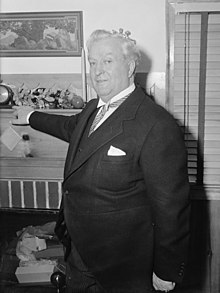Pat McCarran | |
|---|---|
 McCarran in April 1939 | |
| United States Senator from Nevada | |
| In office March 4, 1933 – September 28, 1954 | |
| Preceded by | Tasker Oddie |
| Succeeded by | Ernest S. Brown |
| Chief Justice of the Supreme Court of Nevada | |
| In office January 2, 1917 – January 4, 1919 | |
| Preceded by | Frank Herbert Norcross |
| Succeeded by | Benjamin Wilson Coleman |
| Justice of the Supreme Court of Nevada | |
| In office January 2, 1913 – January 1, 1917 | |
| Preceded by | James G. Sweeney |
| Succeeded by | Edward A. Ducker |
| Nye County District Attorney | |
| In office 1907–1909 | |
| Preceded by | W. B Pittman |
| Succeeded by | Cleve H. Baker |
| Member of the Nevada Assembly from Washoe County | |
| In office 1903–1905 Serving with Peter Burke, W. D. R. Graham, H. R. Cooke, A. D. Graham, J. F. Crosby, J. E. Soucherau | |
| Preceded by | Phil Jacobs, G. E. Peckham, W. W. Webster |
| Succeeded by | Walter Hastings, A. W. Holmes, E. R. Dodge, R. H. Kinney, J. W. Wright, J. S. Orr |
| Personal details | |
| Born | Patrick Anthony McCarran August 8, 1876 Reno, Nevada, U.S. |
| Died | September 28, 1954 (aged 78) Hawthorne, Nevada, U.S. |
| Resting place | Mountain View Cemetery, Reno, Nevada |
| Political party | Democratic |
| Spouse | Harriet Martha "Birdie" Weeks (m. 1903–1954, his death) |
| Children | 5 |
| Profession | Attorney |
Patrick Anthony McCarran (August 8, 1876 – September 28, 1954) was an American farmer, attorney, judge, and Democratic politician who represented Nevada in the United States Senate from 1933 until 1954.
McCarran was born in Reno, Nevada, attended Nevada State University (now the University of Nevada, Reno), and was a farmer and rancher. In 1902, he won election to the Nevada Assembly but left office in 1905 after an unsuccessful campaign for the Nevada State Senate. He studied law privately and was admitted to the bar in 1905, then won election as Nye County District Attorney. He served a two-year term, after which he returned to Reno. From 1913 to 1919, McCarran was a justice of the Supreme Court of Nevada, serving as chief justice from 1917 to 1919. His support for the aviation industry was well known and resulted in Las Vegas's McCarran Field (now Harry Reid International Airport) being named in his honor.
In 1932, McCarran unseated incumbent Republican Tasker Oddie to become the state's first U.S. senator born in Nevada; he was reelected three times and served from 1933 until his death. In his Senate career, McCarran served as chairman of the committees on the District of Columbia, Judiciary, and Joint Foreign Economic Cooperation. As Senator, McCarran is remembered as one of the few Democrats to reject the Second New Deal. He sponsored the Civil Aeronautics Act of 1938 and was a proponent of establishing the United States Air Force. McCarran was a staunch anti-communist, to the point of supporting fascists including Francisco Franco. He sponsored the McCarran Internal Security Act, restricting the political activities of those supporting "totalitarian dictatorship" in the United States. Other significant legislation McCarran sponsored includes the Immigration and Nationality Act of 1952, sometimes referred to as the McCarran-Walter Act, and the McCarran–Ferguson Act, a landmark law exempting the insurance industry from federal regulation, and the 1946 Administrative Procedure Act, which McCarran described as "a Bill of Rights for the hundreds of thousands of Americans whose affairs are controlled or regulated" by federal agencies.
McCarran's career in the Senate was negatively marked by his antisemitism and his conflict with the Franklin Roosevelt administration over the New Deal and cooperation with the Soviet Union in World War II.